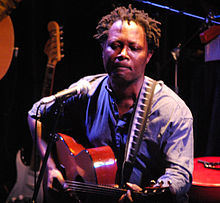Lokua Kanza | |
|---|---|
 Lokua Kanza, Innsbruck, 2010 | |
| Background information | |
| Birth name | Pascal Lokua Kanza |
| Born | April 21, 1958 Bukavu, Belgian Congo (modern-day Democratic Republic of the Congo) |
| Genres | |
| Occupations |
|
| Instrument(s) | Guitar, harmonica, vocals, drums, lap steel |
| Years active | 1980s—present |
| Labels | |
| Website | www |
Pascal Lokua Kanza (born 21 April 1958), known professionally as Lokua Kanza, is a Congolese singer, songwriter, arranger, producer, philanthropist, and multi-instrumentalist. He is known for his soulful, folksy sound, which is atypical of the dancefloor-friendly African rumba music.[1][2][3][4][5] He sings in French, Swahili, Lingala, Portuguese, English, and Wolof. He was a member of the coaching panel of the Voice Afrique Francophone from 2016 to 2017.[6][7]
Kanza began his career as a guitarist in Abeti Masikini's band Les Redoutables in 1980 and later moved to Ivory Coast, where he worked with Best Orchestra.[8][9][10] In 1984, Kanza relocated to Paris, where he emerged as a significant figure within the French world music scene.[11][12] His eponymous debut solo album, Lokua Kanza, released in 1992, catapulted him to stardom and won the Best African Album at the African Music Awards.[13][14][15][16] Kanza's second album, Wapi Yo (1995), yielded his highest commercial success, with the lead single "Shadow Dancer" charting in several European countries.[15][17][18] Kanza released his third album, Lokua Kanza 3, in 1998,[15][19] followed by Toyebi Té (2002),[20][21] Toto Bona Lokua (2004),[22][23] Plus Vivant (2005),[5][24][25] Nkolo (2010),[26] Bondeko (2017),[22] and Moko (2021).[27][28][29]
- ^ "Artist". AAE Music: Premier Booking Agency for Bands, Musicians and Artists. Retrieved 7 July 2023.
- ^ "Festival International Nuits D Afrique". The Gazette Canada. 12 July 2003. p. 66.
- ^ Nzau, Jeannot Ne (12 September 2008). "Congo-Kinshasa: Emission du mois sur Canal Plus Horizon-Lokua Kanza et Bibish Mumbu sur "Afrik'Art" le 15 septembre" [Congo-Kinshasa: Show of the month on Canal Plus Horizon-Lokua Kanza and Bibish Mumbu on "Afrik’Art" on September 15]. Lepotentiel.cd/ (in French). Kinshasa, Democratic Republic of the Congo. Retrieved 14 January 2024.
- ^ Hird, Alison (1 April 2010). "World Tracks - Lokua Kanza and Julien Jacob: exploring music's sounds". Radio France Internationale. Paris, France. Retrieved 7 July 2023.
- ^ a b Daoudi, Bouziane (14 February 2005). "Critique: Les airs aériens de Lokua Kanza" [Critical: The aerial tunes of Lokua Kanza]. Libération (in French). Paris, France. Retrieved 14 January 2024.
- ^ profilbaru.com. "The Voice Afrique Francophone - Profilbaru.Com" (in Spanish). Retrieved 7 July 2023.
- ^ Hazera, Hélène (23 October 1995). "FOLK. Un entretien avec le chanteur polyglotte, sur fond d'intégrité et influences, à l'occasion de son retour scénique et discographique. Loquace Lokua Kanza" [Interview: FOLK. An interview with the polyglot singer, against a backdrop of integrity and influences, on the occasion of his stage and recording comeback. Talkative Lokua Kanza.]. Libération (in French). Paris, France. Retrieved 14 January 2024.
- ^ Cite error: The named reference
:0was invoked but never defined (see the help page). - ^ "Congolese master Lokua Kanza to feature at Hifa". The Herald. Harare, Zimbabwe. 28 November 2011. Retrieved 22 October 2024.
- ^ "Pascal Lokua Kanza launches his new album "Moko" on April 21st". ACP (in French). 12 April 2021. Retrieved 22 October 2024.
- ^ Edgar, Jacob. "Lokua Kanza: Toyebi T�". Rootsworld.com. Retrieved 22 October 2024.
- ^ Davis, Clive (1 October 2002). "Lokua Kanza; World music". The Times (London, England): 21–21.
- ^ Cite error: The named reference
:2was invoked but never defined (see the help page). - ^ Cite error: The named reference
:4was invoked but never defined (see the help page). - ^ a b c Cite error: The named reference
:3was invoked but never defined (see the help page). - ^ Cite error: The named reference
:5was invoked but never defined (see the help page). - ^ Cite error: The named reference
:28was invoked but never defined (see the help page). - ^ Cite error: The named reference
:29was invoked but never defined (see the help page). - ^ Cite error: The named reference
:30was invoked but never defined (see the help page). - ^ Cite error: The named reference
:12was invoked but never defined (see the help page). - ^ Cite error: The named reference
:13was invoked but never defined (see the help page). - ^ a b Cite error: The named reference
:17was invoked but never defined (see the help page). - ^ Cite error: The named reference
:31was invoked but never defined (see the help page). - ^ Cite error: The named reference
:32was invoked but never defined (see the help page). - ^ Cite error: The named reference
:33was invoked but never defined (see the help page). - ^ Cite error: The named reference
:18was invoked but never defined (see the help page). - ^ Cite error: The named reference
:34was invoked but never defined (see the help page). - ^ Cite error: The named reference
:24was invoked but never defined (see the help page). - ^ Cite error: The named reference
:25was invoked but never defined (see the help page).